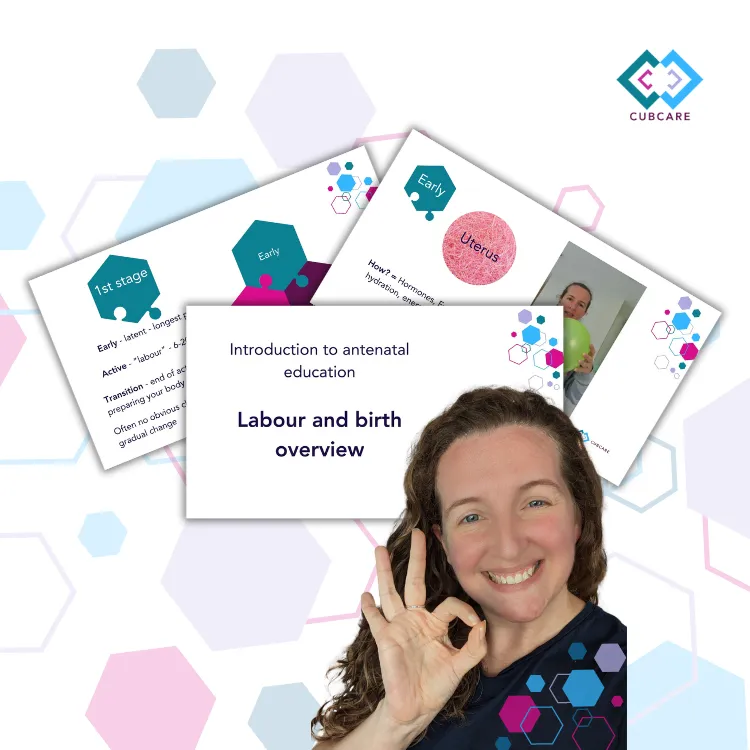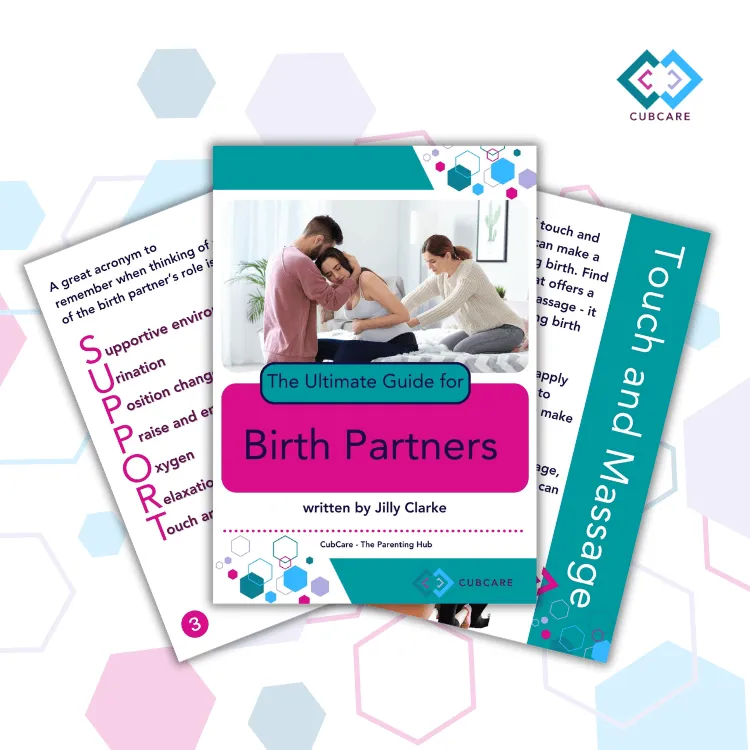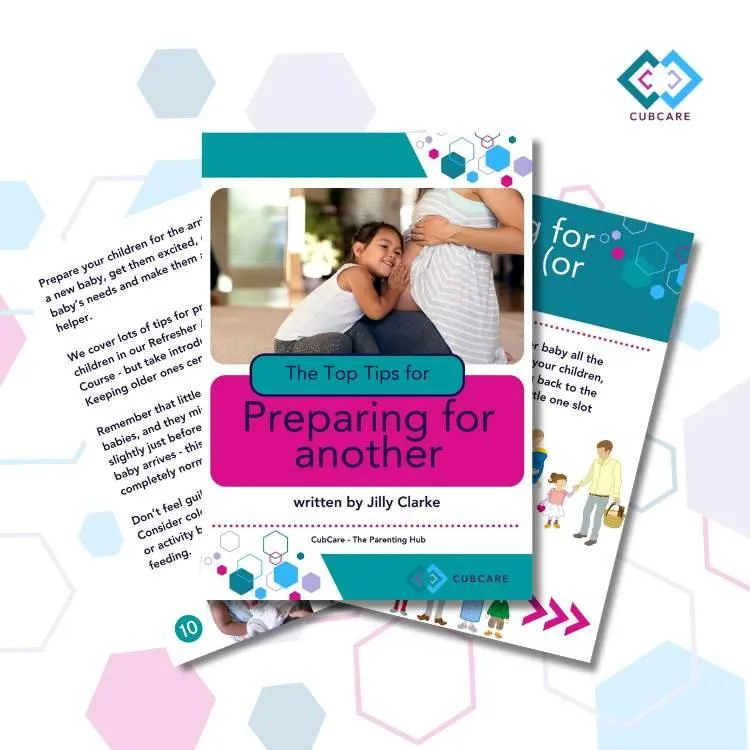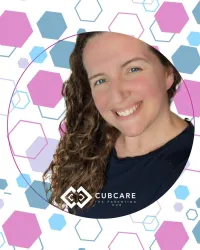We're an award winning Antenatal and Postnatal Education Platform 2025!
(read more here)
CubCare blogs.
From early pregnancy to newborn development.
Advice to help through pregnancy, birth and childhood.
BLOG

Supporting your child’s birth choices as a grandparent
"Birth is one of those things that stays vivid for life.
Whether your experience was positive or difficult, it shaped how you think about what’s “normal,” “safe,” or “best.”" - Jilly Clarke
You’ve been there. You've given birth, had a baby.
You’ve done it.
You remember the sound of the monitor, the rush of people in the room, the weight of your newborn in your arms.
And now, you’re watching your child — or their partner — prepare for birth in their own way. And it brings those feels crashing back.
You might hear them talk about preferences for pain relief, delayed cord clamping, or birth partners. You might notice that their antenatal appointments look different from yours did.
It’s natural to want to help. To warn them of what might be coming, or to gush over the memories of how amazing their birth was.
But sometimes, the most powerful thing you can do is to recognise when your own experience starts to shape how you see theirs.
Why it’s easy to feel conflicted - when your child is preparing for their own birth experience
Birth is one of those things that stays vivid for life.
Whether your experience was positive or difficult, it shaped how you think about what’s “normal,” “safe,” or “best.”
You might think:
• “Why would they refuse an epidural when they could just take the pain away?”
• “Why are they planning to move around when I had to stay still?”
• “Why do they need a plan? Nothing goes to plan in labour anyway.”
These thoughts come from love — from wanting to protect them. But every generation gives birth in a different maternity culture. What felt safe and expected then, or indeed your experience of feeling out of control, might not feel that way now.
The goal isn’t to ignore your experience, there is a real power there. But the goal here is to stop it from becoming the lens through which you judge theirs.

How maternity care has changed in 2025 — and what hasn’t
Some things look very different from a generation ago:
Parents are now encouraged to make informed choices and discuss preferences with their midwives or consultants
Despite this encouragement from outside sources - there is immense pressure for birth to be medicalised in 2025 - the c-section rate is 40% in some parts.
Knowledge of pain relief, monitoring, and intervention options are openly discussed throughout pregnancy in Antenatal Classes - and often offered without discussion in birth
Birth partners are welcomed and supported, not seen as visitors.
But plenty hasn’t changed at all:
Every birth carries uncertainty.
Every parent needs to feel safe, respected, and supported.
Every grandparent wants the same outcome — a healthy baby, and a child who feels cared for.
Keeping sight of those shared goals helps bridge the gap between what birth was and what birth is.

Recognising bias as a Grandparent — and releasing it
When you’ve lived through something as personal as birth, your memory becomes a kind of internal guidebook. It's the same if you are a midwife or Dr who has years of experience with birth. Your experience guides your feelings.
You might not even realise you’re comparing until a comment slips out:
“They’ll change their mind once it starts.”
“They don’t know what they’re in for.”
“I did it this way and it was fine.”
Each one chips away at confidence levels of your child preparing for their child's birth. You might not intentionally mean to, but it quietly chips away.
Before offering advice, try pausing to ask yourself:
• Am I sharing this to be helpful, or to feel useful?
• Do I know for sure that what worked for me still applies now?
• Is this what they’ve asked to hear?
That small space between thought and response is where empathy grows.
Supporting birth choices for your Grandchild, as a Grandparent, without judgement
If your experience is the opposite to the plans you are seeing for your new Grandchild, then your support needs to be led with an openness, and curiosity.
Try saying:
“Tell me about what matters most to you on the day.”
“Would you like me to know your plan so I can support it?”
“If things change, how would you like me to help?”
When you meet them where they are, you show trust in them, in their decisions. That trust can carry through far beyond the birth room — into how confident they feel as new parents, and how safe they feel turning to you for help.
Your experience is not their experience.

When their plans for birth don’t match your instincts as a Grandparent
It can be hard to watch your child make decisions that differ from what you’d choose — or what you were told was “best.”
Maybe they’re declining early induction. Maybe they’re planning an elective caesarean. Maybe they want to wait before visitors arrive.
With respect, tough.
It’s not your journey, your decision, or your place to question.
You don’t have to agree with every detail. What matters is that they feel respected, because anything else will build resentment. If your child has made an informed and educated decision, then that is theirs to make.
Instead of reacting, you can ask:
“I can see this matters to you. How can I support that?”
It shifts the focus from persuasion to partnership.
The influence grandparents really have
Supportive families make a measurable difference. And families who undermine and question informed decisions create lasting, and huge rifts. I've seen this happen so many times over the years with clients and their families.
When people in labour feel emotionally safe and backed by those closest to them, their stress hormones drop — and they recover faster, feed more easily, and bond more deeply. When they feel unsupported, the climb back to confidence postpartum is huge.
You don’t need medical knowledge or a front-row seat in the delivery room to make that happen. You just need empathy, presence, and perspective. Whether you are physically present in the birth room or not does not matter, your emotional connection to the situation, and their choices, provides so much confidence and reassurance.
You’ve already done the hard work of bringing life into the world. Bringing them up to be independent, thoughtful, research led individuals.
Now, your work is to make space for someone else’s version of that story.
Supporting your child through their birth, their way
Letting go of “how we did it” doesn’t erase what you know. It makes room for what they need.
Your experience remains valuable — not as a rulebook, but as reassurance that they’re not alone in finding their way through birth and beyond.
Everyone's story is different, everyone's journey is different.
That’s the kind of support that carries through generations.
Learn more about supporting birth choices as a Grandparent.
The CubCare Grandparents Course is part of our award winning collection of Antenatal and Parenting online courses, and explores exactly this — how to stay informed, confident, and genuinely helpful during pregnancy, birth, and early parenthood.
It gives you the latest evidence on modern maternity care and shows you how to offer practical, emotional, and non-judgemental support — while still honouring your own experiences.
Explore the CubCare Grandparents Course
Refresher Antenatal Course in person
Refresher Antenatal Course online
Birth Partner course (included in our Antenatal course)
Antenatal Course in person
Antenatal Course online
Easily navigate to our most popular Blog categories
Download our Freebies

Labour and Birth
Watch our introduction to antenatal education webinar, our labour and birth overview - to start your antenatal education journey. Understanding the process, and what you can do to influence it.

Pregnancy Planner
Free Pregnancy Planner to help you prepare for a little one. Prepare your body, your mind, your finances and your home. Get organised, feel good and prepare for an active, positive birth.

Birth Partner Guide
Your ultimate guide to being the best birth partner during pregnancy, birth and recovery. Learn what you need to do, and what you need to learn to be the best birth partner possible.

Expecting Again Guide
Your ultimate guide to preparing for another birth and an extra baby. Our top tips for navigating pregnancy and birth, and helping your older ones to transition into their new role as a big sibling.
Based in Welwyn Hatfield, offering local pregnancy support and doula services across Hertfordshire: St Albans, Hatfield, Welwyn Garden City, Potters Bar, Stevenage, Harpenden, Hitchin, Barnet, Mill Hill and surrounding areas.
Online antenatal and postnatal education available UK-wide.
© Copyright 2025 CubCare The Parenting Hub. CubCare is operated by The Birth and Baby Company Ltd. Company No. 15655287
Privacy Policy | Terms & Conditions | Medical Disclaimer | Inclusivity and Accessibility

